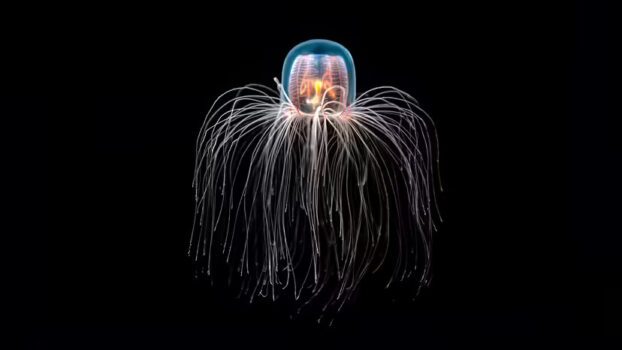The Immortal Jellyfish: Nature’s Eternal Enigma that Never Die
Deep beneath the surface of the world’s oceans drifts a creature so mysterious and extraordinary that it defies the very rules of life and death. Known scientifically as Turritopsis dohrnii, but often referred to simply as “The Immortal Jellyfish,” this tiny, translucent marvel has captured the curiosity of scientists, philosophers, and nature lovers alike. Why? Because it possesses what no other known creature naturally does: the ability to potentially live forever.
In this in-depth exploration, we’ll journey into the incredible world of the immortal jellyfish, unpacking how it cheats death, the science behind its so-called immortality, and what it reveals about life itself.
The Secret of Immortality: How the Immortal Jellyfish Lives Forever
To understand the immortal jellyfish’s unique capabilities, we must first look at its lifecycle.
Most jellyfish, like other animals, go through a life cycle that ends in death. They begin as fertilized eggs that become larvae, which settle onto surfaces and develop into polyps. From there, they bud off into medusae, the bell-shaped adult jellyfish most of us recognize. Eventually, the jellyfish grows old and dies.
But Turritopsis dohrnii has a unique trick up its sleeve.
When faced with physical damage, environmental stress, starvation, or even old age, the immortal jellyfish doesn’t simply perish. Instead, it undergoes a process known as transdifferentiation. In this process, the jellyfish reverts its cells to an earlier stage of development, essentially turning back into a polyp. From there, it can grow into an entirely new adult jellyfish, starting the cycle all over again.
This isn’t mere regeneration, it’s biological time travel.
Imagine if a butterfly could revert to a caterpillar and begin life anew, or if a human being could return to infancy and grow up again with every serious illness or injury. That’s the level of strangeness and wonder we’re dealing with.
How Immortal Is the Immortal Jellyfish?
Despite its evocative name, the immortal jellyfish isn’t invincible. It can still be eaten by predators, destroyed by disease, or killed by significant environmental changes. Its “immortality” refers only to its ability to revert to a juvenile state and avoid death from aging or damage under normal circumstances.
In theory, if left alone in a perfectly safe environment, it could live indefinitely, cycling through its life stages over and over. However, such conditions rarely exist in nature, and in the wild, most immortal jellyfish don’t live forever.
Still, the potential is there. This places Turritopsis dohrnii in a rare category of biological immortality, a kind of loophole in the rule that all living things must eventually die.
Does the Immortal Jellyfish Have Blood?
The immortal jellyfish, like all jellyfish, is a member of the phylum Cnidaria, a group of simple aquatic animals that includes corals, sea anemones, and other jellyfish. It does not have blood, at least not in the way that mammals or vertebrates do.
Instead, jellyfish rely on a process known as diffusion to circulate nutrients and oxygen through their gelatinous bodies. Their bodies are composed of over 95% water, with a simple body plan that lacks a centralized brain, heart, or circulatory system.
They absorb oxygen directly from the water through their outer membrane, and waste products are expelled the same way. Because of their simplicity, jellyfish, including Turritopsis dohrnii, don’t require blood or blood vessels to sustain life.
Do Immortal Jellyfish Sleep?
The concept of “sleep” in simple organisms like jellyfish is not entirely analogous to what humans experience. However, there is growing evidence that even organisms without a brain, like jellyfish, exhibit behaviors that resemble sleep.
A 2017 study from the California Institute of Technology and Stanford University found that another type of jellyfish (Cassiopea, or the upside-down jellyfish) showed periods of reduced activity and responsiveness that align with the basic criteria of sleep. This included slower pulsing, delayed responses to stimuli, and a compensatory period of increased rest following deprivation.
Although this research wasn’t conducted on Turritopsis dohrnii specifically, it raises fascinating possibilities. It suggests that even brainless creatures may have a form of rest essential to biological function.
So, while we cannot definitively say that the immortal jellyfish “sleeps” as humans do, it likely experiences a form of physiological rest, an ancient precursor to sleep, perhaps.
How Old Is the Oldest Jellyfish?
Determining the exact age of a jellyfish, especially one that can revert to earlier stages of life, is no easy feat. Most jellyfish, including Turritopsis dohrnii, do not leave behind hard body parts that can be aged, like bones or shells.
Because of this, no one knows the exact age of the oldest immortal jellyfish. In captivity, researchers have observed individuals undergoing the rejuvenation process multiple times, but over a relatively short period.
In theory, a single individual could be thousands of years old if it managed to survive all threats. But in reality, no specimen has ever been confirmed to have lived beyond a few years, mainly due to environmental hazards and the difficulty of long-term observation.
Even so, the possibility that a jellyfish could be functionally immortal for centuries, even millennia, remains an awe-inspiring idea.
Is the Immortal Jellyfish Intelligent?
The immortal jellyfish lacks a brain or central nervous system, and as such, it does not possess intelligence in the way we typically understand it.
Instead of a brain, it has a nerve net, a decentralized system of neurons that controls basic functions like swimming, feeding, and responding to light or touch. This is sufficient for its survival in the ocean’s relatively low-demand environment but doesn’t allow for complex behavior, memory, or decision-making.
That said, it’s important to distinguish between intelligence and adaptability. While the jellyfish may not “think,” its ability to reverse its life cycle is a highly sophisticated biological response. It’s a form of adaptive genius built into its very structure, a kind of “intelligence” at the cellular level.
So, while it doesn’t ponder its existence or solve problems like a dolphin or octopus might, Turritopsis dohrnii does possess an elegant, evolutionarily tuned strategy for survival.
Why the Immortal Jellyfish Fascinates Us
The story of the immortal jellyfish captures the imagination because it seems to exist outside the natural order. Everything we know about life on Earth suggests a finite existence, yet here is a creature that potentially sidesteps death altogether.
Its life is a metaphor for rebirth, resilience, and the possibility of transformation. Scientists are actively studying the mechanisms behind its transdifferentiation abilities in hopes of uncovering medical breakthroughs. Understanding how the jellyfish reprograms its cells could one day lead to advances in regenerative medicine, anti-aging therapies, and even cancer treatment.
After all, the ability to convert one type of cell into another is a foundational idea in stem cell research, and the immortal jellyfish is a natural master of this art.
The Eternal Drifter
The immortal jellyfish is a quiet voyager through time, its body soft and luminous, its movements slow and ethereal. It drifts through the ocean’s dark blue silence, evading the final curtain that falls on most life.
It does not dominate its environment, nor does it seek attention. Instead, it endures. Silently. Elegantly. Mysteriously.
As we continue to explore the depths of the ocean and the even deeper mysteries of biology, Turritopsis dohrnii stands as a beacon of the unknown. It challenges our understanding of aging, death, and what it means to be alive.
Perhaps its greatest lesson isn’t about avoiding death at all, but about the astonishing creativity of life, how nature, when pushed to its limits, finds ways to persist, transform, and adapt.
The immortal jellyfish doesn’t live forever because it’s perfect or powerful. It lives forever because it’s humble enough to start again.
And that, in itself, might be the most profound kind of immortality.




